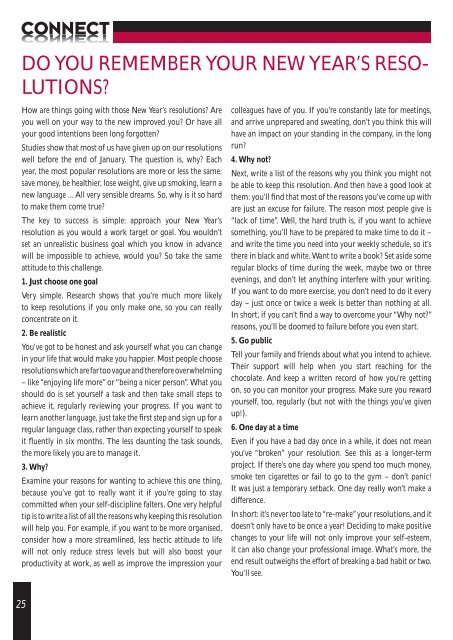You also want an ePaper? Increase the reach of your titles
YUMPU automatically turns print PDFs into web optimized ePapers that Google loves.
DO YOU REMEMBER YOUR NEW YEAR’S RESO-<br />
LUTIONS?<br />
How are things going with those New Year’s resolutions? Are<br />
you well on your way to the new improved you? Or have all<br />
your good intentions been long forgotten?<br />
Studies show that most of us have given up on our resolutions<br />
well before the end of January. The question is, why? Each<br />
year, the most popular resolutions are more or less the same:<br />
save money, be healthier, lose weight, give up smoking, learn a<br />
new language ... All very sensible dreams. So, why is it so hard<br />
to <strong>ma</strong>ke them come true?<br />
The key to success is simple: approach your New Year’s<br />
resolution as you would a work target or goal. You wouldn’t<br />
set an unrealistic business goal which you know in advance<br />
will be impossible to achieve, would you? So take the same<br />
attitude to this challenge.<br />
1. Just choose one goal<br />
Very simple. Research shows that you’re much more likely<br />
to keep resolutions if you only <strong>ma</strong>ke one, so you can really<br />
concentrate on it.<br />
2. Be realistic<br />
You’ve got to be honest and ask yourself what you can change<br />
in your life that would <strong>ma</strong>ke you happier. Most people choose<br />
resolutions which are far too vague and therefore overwhelming<br />
– like “enjoying life more” or “being a nicer person”. What you<br />
should do is set yourself a task and then take s<strong>ma</strong>ll steps to<br />
achieve it, regularly reviewing your progress. If you want to<br />
learn another language, just take the first step and sign up for a<br />
regular language class, rather than expecting yourself to speak<br />
it fluently in six months. The less daunting the task sounds,<br />
the more likely you are to <strong>ma</strong>nage it.<br />
3. Why?<br />
Examine your reasons for wanting to achieve this one thing,<br />
because you’ve got to really want it if you’re going to stay<br />
committed when your self-discipline falters. One very helpful<br />
tip is to write a list of all the reasons why keeping this resolution<br />
will help you. For example, if you want to be more organised,<br />
consider how a more streamlined, less hectic attitude to life<br />
will not only reduce stress levels but will also boost your<br />
productivity at work, as well as improve the impression your<br />
25<br />
colleagues have of you. If you’re constantly late for meetings,<br />
and arrive unprepared and sweating, don’t you think this will<br />
have an impact on your standing in the company, in the long<br />
run?<br />
4. Why not?<br />
Next, write a list of the reasons why you think you might not<br />
be able to keep this resolution. And then have a good look at<br />
them: you’ll find that most of the reasons you’ve come up with<br />
are just an excuse for failure. The reason most people give is<br />
“lack of time”. Well, the hard truth is, if you want to achieve<br />
something, you’ll have to be prepared to <strong>ma</strong>ke time to do it –<br />
and write the time you need into your weekly schedule, so it’s<br />
there in black and white. Want to write a book? Set aside some<br />
regular blocks of time during the week, <strong>ma</strong>ybe two or three<br />
evenings, and don’t let anything interfere with your writing.<br />
If you want to do more exercise, you don’t need to do it every<br />
day – just once or twice a week is better than nothing at all.<br />
In short, if you can’t find a way to overcome your “Why not?”<br />
reasons, you’ll be doomed to failure before you even start.<br />
5. Go public<br />
Tell your family and friends about what you intend to achieve.<br />
Their support will help when you start reaching for the<br />
chocolate. And keep a written record of how you’re getting<br />
on, so you can monitor your progress. Make sure you reward<br />
yourself, too, regularly (but not with the things you’ve given<br />
up!).<br />
6. One day at a time<br />
Even if you have a bad day once in a while, it does not mean<br />
you’ve “broken” your resolution. See this as a longer-term<br />
project. If there’s one day where you spend too much money,<br />
smoke ten cigarettes or fail to go to the gym – don’t panic!<br />
It was just a temporary setback. One day really won’t <strong>ma</strong>ke a<br />
difference.<br />
In short: it’s never too late to “re-<strong>ma</strong>ke” your resolutions, and it<br />
doesn’t only have to be once a year! Deciding to <strong>ma</strong>ke positive<br />
changes to your life will not only improve your self-esteem,<br />
it can also change your professional i<strong>ma</strong>ge. What’s more, the<br />
end result outweighs the effort of breaking a bad habit or two.<br />
You’ll see.






